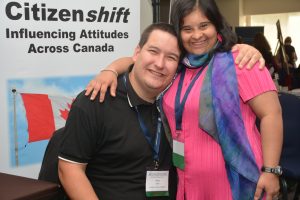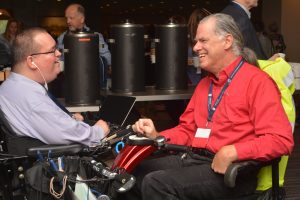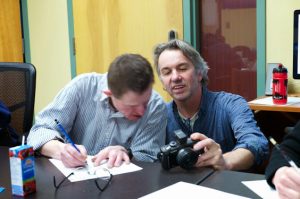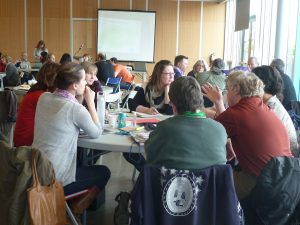British Columbia has a long history of being recognized internationally for providing leadership and innovation in supporting people with intellectual and developmental disabilities and their families. The strength of the community living movement in BC today has grown from deep roots in family and self advocacy leadership, strong community and government partnerships and, over the decades, champions and leaders committed to creating change, working together.
 The CIIS was originally established as the Centre for Inclusion and Citizenship in 2009 through a partnership of university, government, and community living organizations and supporters seeking to further the inclusion and full citizenship of people with intellectual and developmental disabilities and their families locally, nationally, and globally. More specifically, beginning in the mid- 2000s, community stakeholders sought out Professor Stainton at UBC to establish the Centre to meet an identified need to conduct evidence-based research in BC to influence and inform policy and practice and to translate that knowledge into best practices. Subsequently, in 2008, based on Dr. Hole’s programme of research and their previous collaborations, Dr. Stainton reached out to Dr. Hole to join him in establishing and co-directing the Centre for Inclusion and Citizenship at both UBC campuses, which formally opened in February 2009.
The CIIS was originally established as the Centre for Inclusion and Citizenship in 2009 through a partnership of university, government, and community living organizations and supporters seeking to further the inclusion and full citizenship of people with intellectual and developmental disabilities and their families locally, nationally, and globally. More specifically, beginning in the mid- 2000s, community stakeholders sought out Professor Stainton at UBC to establish the Centre to meet an identified need to conduct evidence-based research in BC to influence and inform policy and practice and to translate that knowledge into best practices. Subsequently, in 2008, based on Dr. Hole’s programme of research and their previous collaborations, Dr. Stainton reached out to Dr. Hole to join him in establishing and co-directing the Centre for Inclusion and Citizenship at both UBC campuses, which formally opened in February 2009.
We work hard to make research in the area of intellectual and developmental disabilities (I/DD) relevant and accessible to a wide range of individuals in diverse disciplines and populations. A provincial advisory board, whose membership includes self advocates (individuals with I/DD), family members, service providing agencies, provincial advocacy organizations, and government, has been in place since the Centre’s inception. The advisory board offers advice to the Institute, ensures information flows between community and the university, informs research priorities, assists in the design and implementation of projects, facilitates the communication of results, and helps to evaluate application of the results.
After ten years of successfully operating as a research centre, we transitioned to a research institute in 2019.



Given our strong roots in the community living sector, the Institute will continue to be uniquely positioned to engage in collaboration with community and government partners in our work. This will contribute to our ability to secure research grants and contracts as well as our ability to engage in meaningful knowledge translation with knowledge users and brokers.